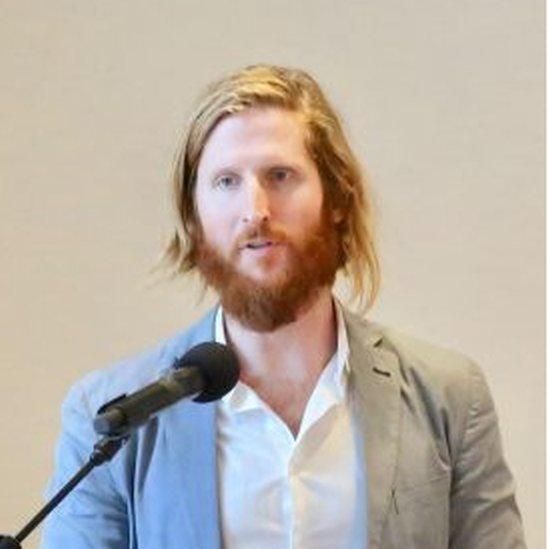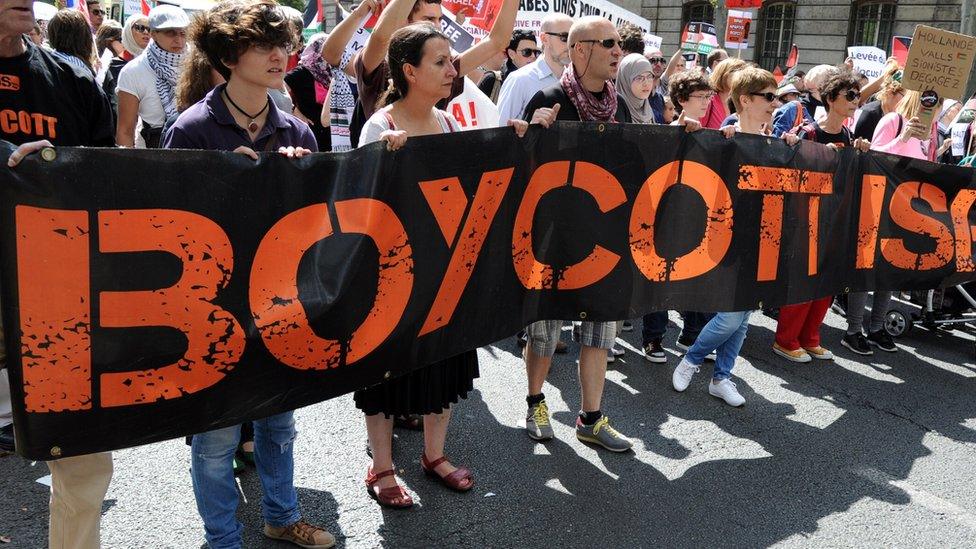Michigan professor embroiled in Israel boycott row
- Published

Professor Cheney-Lippold
A University of Michigan professor has come under fire for declining to provide a recommendation letter, citing his support for an Israel boycott.
John Cheney-Lippold turned down the student's request after he learned it was for studying in Israel. A Zionist group later shared his response online.
Critics said the email was anti-Semitic and called for him to be fired.
The academic says he supports the Boycott, Divestment and Sanctions (BDS) movement for human rights reasons only.
The BDS movement accuses Israel of human rights violations and says it opposes "all forms of racism", including anti-Semitism.
"I reject any attack of anti-Semitism," Prof Cheney-Lippold told the BBC.
"The boycott of state institutions of Israel has nothing to do with the people - it has everything to do with not normalising a system that is apartheid-like."

Pro-Israel and pro-Palestinians protesters in New York last year
The debate around his decision was first reported by the Michigan Daily university newspaper, external.
Israel is accused by some critics of practising a form of apartheid - the state-sanctioned racial discrimination of black people during white-minority rule in South Africa - against Israeli Arabs and Palestinians in the occupied West Bank.
Israel has vehemently rejected this allegation.
Prof Cheney-Lippold, who teaches digital media and cultural studies, says he explained his decision to the student in order to be upfront with her and to make it clear that it was about his political views only.
He apologised, and noted that many university departments had agreed to "an academic boycott against Israel in support of Palestinians living in Palestine".
"This boycott includes writing letters of recommendation for students planning to study there," he wrote. "Let me know if you need me to write other letters for you, as I'd be happy."
The student did not respond immediately to a request for comment from the BBC.
BDS's Michael Deas explains the thinking behind the boycott campaign (2015)
The professor's 5 September email was shared days later on social media by Club Z, a youth Zionist organisation based in California.
Masha Merkulova, executive director of Club Z, described Prof Cheney-Lippold's email as "bigotry and discrimination".
"Nobody is preventing him from expressing his political views," she told the BBC.
"Those truly interested in promoting peace in the region should work to build bridges, instead of engaging in boycotts."
Israel's then Deputy Foreign Minister Tzipi Hotovely: "Israel and apartheid have nothing in common." (2015)
In addition to accusations of anti-Semitism from Israel supporters, online critics have said Prof Cheney-Lippold overstepped in his role as an educator by imposing his political beliefs on a student.
A University of Michigan spokeswoman told the BBC in a statement that "injecting personal politics into a decision" about supporting a student is against the college's beliefs.
"While members of the University of Michigan community have a wide range of individual opinions on this and many other topics, the university has consistently opposed any boycott of Israeli institutions of higher education," the statement said.
In 2017, the college's Board of Regents rejected a student government resolution, external to divest from pro-Israeli companies, saying boycotts and sanctions "offend [the] bedrock values of our great university".
Prof Cheney-Lippold told the BBC he has been receiving "a barrage of hate mail [and] death threats" since the email went viral, but that most people at the University of Michigan have been supportive.
"I only ask that the university respect my right to maintain my view and that the public sees this as a non-violent protest," he said.
Ms Merkulova of Club Z told the BBC that by singling out the student who wanted to study in Israel, the professor was showing "prejudicial treatment".
"That's not free speech," she says. "Acting in his professional capacity, this professor violated his school's policy."
"Professors, administrators, and universities must be held accountable when acts of intolerance like these occur on any college campus, whether they are directed at Jewish students or any other group."
- Published18 November 2019

- Published23 July 2015

- Published19 July 2018

- Published8 November 2016
